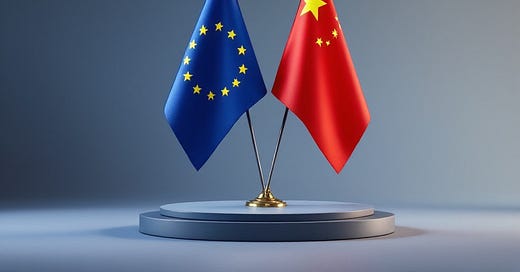Europe, China, and strategic autonomy
Strategic autonomy and multipolarity are keywords on Europe in China's White Paper on National Security — and demonstrate the need for more systematic European geopolitical thinking.
The Chinese government has released its “White Paper on National Security in the New Era” on 12 May 2025. While China, in contrast to the United States or other European states, does generally not publish its national security strategies, the document provides insights into Chinese strategic thinking about global order and international security dynamics.
Without diving into the (certainly interesting) details of the White Paper in this paper —others have elaborated on the main ideas or the relevance of multipolarity in the document —, it is worth looking at the wording on Europe and reflecting on the implications for Europe-China relations.
So how does China see Europe in the White Paper? Unsurprisingly, not as the key priority: only two lines are found on the relationship with Europe. In light of the purpose of the document, this is barely unusual, as the key objective consists in outlining China’s broader vision on security. The framing is not significantly different from existing statements, but two concepts Europeans are well familiar with figure prominently in this context: strategic autonomy and multipolarity.
中国始终视欧洲为合作伙伴,认为欧洲是多极世界中的重要一极,支持欧洲加强战略自主。中国致力于同欧洲发展全面战略伙伴关系,愿与欧洲共同维护自由贸易,共同捍卫多边主义,携手积极应对气候变化等全球性挑战。
China has always regarded Europe as a partner, believes that Europe is an important pole in a multipolar world, and supports Europe in strengthening its strategic autonomy. China is committed to developing a comprehensive strategic partnership with Europe and is willing to work with Europe to safeguard free trade, defend multilateralism, and work together to actively respond to global challenges such as climate change. [own translation]
Chinese thinkers have historically endorsed the concept of European strategic autonomy and consider the idea as generally positive for China. Often associated with less European dependence on the United States — and consequently less alignment with US strategic or simply following US leadership — could therefore benefit European engagement with China, so the reasoning.
The new White Paper on National Security in the New Era comes at a moment where Europe-China relations could indeed undergo a redefinition. Following the US elections and at best critical, at worst openly hostile signals from the White House towards Europe, discussions on Europe’s relations with Beijing have gained traction again.
Over the last years, especially the EU Commission had emphasised the importance of de-risking in European approaches towards China, and the tone in Brussels and national capitals clearly changed. In fact, European and US China policy moved closer in recent years through European approaches more consequently focusing on export controls or screening of foreign direct investment in critical areas; although the Biden administration would have preferred Europeans to go further, it is undeniable that the policy overlap between Washington and Beijing increased under the previous administration.
However, the increasing uncertainty in the transatlantic relationship now represents a new challenge for Europe: whether it is tariffs or more general strategic questions, “the European Union seeks the right balance” between the United States and China — and defining its approach between the two great powers, especially as the United States exact approach towards China still remains to be defined, is indeed a balancing act for European states.
Historically, European China policy has always had a transatlantic component: while the US foreign policy community often refers to China as the “China challenge”, Europe has its very own “transatlantic China challenge”. The transatlantic alliance and the US security guarantees for Europe also implied parallel risks of abandonment (by the US on the European continent) and entrapment (with the US in a confrontation with China, at least strategically). Now that transatlantic ties are shaken by the Trump administration, the notion of European strategic autonomy is gaining traction again: there is an increased willingness of Europeans to not only (finally) enhance their defence efforts to be able to defend themselves, but also to become less dependent on the United States’ strategic leadership, given that it is questionable to what extent European and US global interests overlap.
The wording from China’s White Paper on National Security in the New Era might hence resonate with those calling for Europe as a strong actor in the global order, not at least because the EU Commission repeatedly emphasises the importance for the EU to become a true geopolitical actor in a multipolar world characterised by strategic competition. And in fact, some conclude that the current state of the transatlantic relationship must lead Europe to reconsider its approaches, leading to calls for more European engagement with China, for example on Ukraine.
These options might be worth considering in light of the complex situation in Ukraine, and engaging with Beijing on key questions of global governance will be without an alternative if Europeans seek to address cross-cutting challenges like climate change.
Nevertheless, calls for strategic autonomy often gloss over the deeper underlying problem — which is the lack of geopolitical thinking in Europe, and about an actual definition of Europe’s ambition and role in a changing global order. Strategic autonomy should not start with choosing sides, but rather with a notion of European interests, priorities, and vulnerabilities in a changing global order, and its vision of and response to border global dynamics and trends. Europe’s relationship with China in a changing transatlantic context is a litmus test for this capacity of strategic thinking: it will demonstrate whether Europe is capable to develop a macro-vision of global order and a grand strategy (or, realistically, individual grand strategies) linking ends, means, and ways to respond to the challenges and opportunities of this order.




